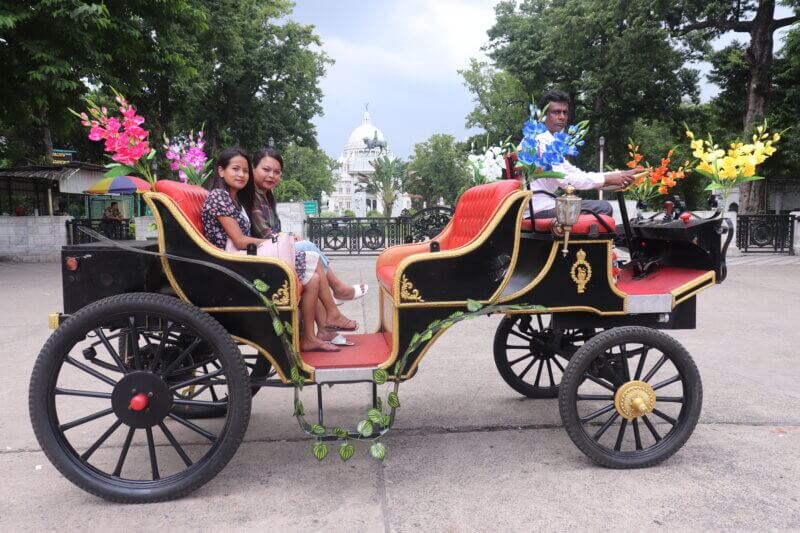Calcutta High Court Directs State Government to Submit Rehabilitation Plan to Replace Horse Carriages Following PETA India’s Efforts
In a just-released order acknowledging the merit of prohibiting victoria horse carriages in Kolkata, as advocated for by PETA India and CAPE Foundation, the Hon’ble Calcutta High Court directed the state government to come forward with a proposal for rehabilitating horse owners and providing them with an alternative livelihood to hauling tourists in victoria carriages so that “dispensing with the horse drawn carriages as done in Mumbai can be considered and examined for its feasibility”. In Mumbai, beautiful heritage-style e-carriages have replaced horse-drawn carriages.
In the order passed by a bench comprising of Hon’ble Chief Justice TS Sivagnanam and Hon’ble Justice Hiranmay Bhattacharyya in writ petitions 318 and 327 of 2021 filed by PETA India and CAPE Foundation, respectively, the High Court expressed serious concern over the state government’s consistent failure to adequately address regulatory and welfare issues relating to horses in the city, stating, “[E]verything looks good on paper but [nothing] worthwhile has happened thus far.” The justices noted that no reports on health camps for horses had been produced by the Animal Husbandry and Veterinary Services Department for five months. In letters of complaint, PETA India has pointed out that even past health camps have been an eyewash.
The court took serious note of recent incidents in which horses collapsed at the Maidan and elsewhere in Kolkata due to apparent weakness, malnourishment, and dehydration. PETA India points out their pathetic condition is from neglect and the hardship of being forced to haul heavy carriages on hard roads. The court also noted other issues such as wide-scale prevalence of unlicensed hackney carriages in the city and the high rate of abandonment of ailing and unfit horses by their owners. The court directed routine surprise inspections to curb the proliferation of unlicensed horse-drawn carriages in Kolkata. In response to the high rate of horse abandonment, the court directed the government to identify abandoned or stray horses and submit a list to the court to facilitate accountability and rehabilitation efforts. It also directed the government to carry out another comprehensive health inspection of the horses being used to ply carriages in and around the Maidan.
In just the last month, reports have surfaced that at least four equines, including one pony, were unable to bear the heat and collapsed from exhaustion and malnourishment in Kolkata. One of these horses, who is lame, in extreme pain, and suffering from open and untreated wounds, the absence of frogs in all four hooves, and swelling in flexor tendons and joints, has been rehabilitated by PETA India at a sanctuary in Rajarhat.
In recent months, at least six horses have died in Kolkata. And as evidenced by information documented by PETA India and CAPE Foundation, dozens of horses in the city were found to be anaemic, malnourished, and chronically starved as well as with serious health conditions such as broken bones. Even though the horses are in poor condition and suffer from irreversible conditions as a result of being forced to work on hard roads, they are still made to pull heavy carriages. When they’re not working, there’s no relief, as they’re forced to stand in their own faeces without shelter.
The use of horses to pull carriages creates a risk of zoonotic disease such as glanders, which is almost always fatal in humans, especially when the animals are deteriorated and lack suitable veterinary care. They also pose a serious traffic hazard.
PETA India has repeatedly written to authorities in West Bengal, pleading with them to spare horses further suffering, and through this public interest litigation, PETA India hopes the Calcutta High Court will prohibit the use of horses for hauling carriages in the city.






